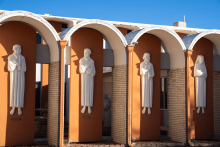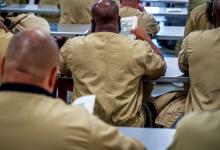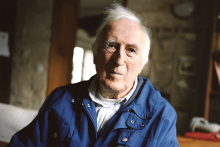Abuse
As the Apostle Paul warns us in 1 Timothy 6:9: “But those who want to be rich fall into temptation and are trapped by many senseless and harmful desires that plunge people into ruin and destruction.” And if you want proof of Paul’s words, look no further than the release of Jeffrey Epstein’s emails.

When Holly Berkley Fletcher was a child, she once heard her missionary parents “literally introduced as ‘Super Christians.’” In a white American evangelical culture that idolizes missionaries in this way, how do we speak honestly about the harm missions too often leave in their wake? In Fletcher’s new book The Missionary Kids: Unmasking the Myths of White Evangelicalism (Broadleaf Books), missionaries’ grown children offer a complex and fascinating perspective.
Fletcher—a historian, former CIA analyst, and missionary kid (MK) herself—draws on extensive research, her own experience as an MK, and surveys and interviews with fellow MKs to present a wide-ranging look at MKs’ experiences. Without losing sight of the noble intentions of most missionaries and the good work that many of them do, she pulls back the curtain on the perceived saintliness of missionaries, uncovering an alarming multitude of systemic harms. In doing so, she exposes key myths at the core of white American evangelicalism itself.

Across the U.S., 40 dioceses and religious orders have declared bankruptcy. The first was the Archdiocese of Portland, Oregon, in 2004. The most recent was the Diocese of Burlington, Vermont, in late September 2024. The cases vary, but they have one thing in common: The day the diocese filed its petition for bankruptcy is a new benchmark — no one is allowed to file claims against the church for abuses that happened before that date, even if a given state retroactively extends the statute of limitations.

Trauma changes your memories. When I think of traumatic experiences in my life — what happened, how I felt before that moment, how I felt afterward, the changes I’ve noticed in myself since — they often play in short bursts. Those bursts are rarely sequential, and the length of time they last depends on how long I allow myself to linger on a memory.
Filmmaker RaMell Ross’ Nickel Boys, an adaptation of Colson Whitehead’s 2019 Pulitzer Prize-winning novel, is a record of trauma. It tells the story of two Black boys’ experience at an abusive reform academy in Jim Crow-era Florida. The fictional Nickel Academy is inspired by an actual place, Florida’s Dozier School for Boys, where students received brutal treatment at the hands of staff. A 2012 investigation by the University of South Florida uncovered dozens of human burial sites on the property.
Ross does something unique with this story about trauma, memory, and how they relate to each other: He makes it feel authentic.

Unholy Power
Kristin Kobes Du Mez and Carl Byker’s short documentary, For Our Daughters, displays the evangelical church’s dangerous pattern of protecting abusive men — from the pulpit to the White House — to maintain social and political power, often to the detriment of women. www.forourdaughtersfilm.com

Like any Black man, I’ve had no choice but to learn how to navigate racism. But as a man, I’ve had to intentionally educate myself and correct my own sexist behavior.
Men often fear critiques of patriarchy, but I want to keep learning about feminism, which I understand to be the fight for women’s right to self-determination. I was taught to believe that a woman’s central purpose is to serve men’s needs — a message that came from both religious and secular sources. But I am learning that I can challenge that message.
With a feminist framework, I can see that my socialization into gender roles started early. My parents, mass media, the education system, and the church were all part of training me — sometimes overtly and sometime subtly — to believe that because I was male, I was superior to women.

In Priscilla, which is based off Priscilla Presley’s 1985 memoir Elvis and Me, we don’t primarily see Elvis through the eyes of his manager or adoring fans, instead, we see him through the eyes of the only woman he ever married, who he began courting when he was 24 and she was 14.

A group of Catholic Church abuse victims and their advocates on Wednesday called on Pope Francis to enforce “zero tolerance” against clerical sex abuse, after completing a six-day pilgrimage to Rome carrying a large wooden cross.

THE BEST CHRISTIAN MOVIE you’ve never seen (even though it was Oscar-nominated for best picture!) turns 10 this year. That movie is Philomena, adapted from The Lost Child of Philomena Lee: A Mother, Her Son and A Fifty-Year Search, by British journalist Martin Sixsmith. The film stars Dame Judi Dench as the titular mother and Steve Coogan as Sixsmith. While the book primarily focuses on Philomena’s son Michael Hess, the film more closely traces the mother’s story. As a pregnant teenager, Philomena was abandoned to a convent of nuns who forced young women to work without pay and sold their children to wealthy Americans looking to adopt.
On her son’s 50th birthday, Philomena weeps, clutching the only pictures she has of him. Despite her efforts, she has never been able to learn his fate. When Sixsmith, a disgraced journalist, learns of Philomena’s plight, he agrees to help her. What began as a distraction from his own troubles soon shifts to captivation. Despite Philomena’s assurances that the sisters of the convent have done their best to care for the women and children in their charge, Sixsmith uncovers a devilish conspiracy of silence.

Families like the Duggars go to great lengths to ensure their kids never learn to give anyone the middle finger — and I can only imagine the Duggar children would have been strictly punished if they had. But as a Christian and a father, I believe it’s neither possible nor desirable to exert total control over my children’s education and experience of the world around them.

Sexual abusers are disgusting “enemies” who deserve to be condemned and punished — but also deserve Christian love and pastoral care because they too are children of God, Pope Francis said.

BEFORE HE STEPS onstage as Ike Turner in TINA: The Tina Turner Musical, Garrett Turner (no relation) does a simple ritual: He swirls a wooden mallet along the rim of a Tibetan singing bowl. As the sound washes over him, he focuses on himself as Garrett, not Ike the musician and abusive ex-husband of the “Queen of Rock ’n’ Roll.” And he prays.
“Tina found Buddhism on her way to liberation from Ike, and it was something that Ike decried,” Garrett told me a few days after I saw him perform in Atlanta. Embracing something that Ike pushed away helps Garrett become Ike onstage while remaining Garrett within. With eight shows a week for the touring Broadway production, this spiritual practice helps Garrett draw a clear line between himself and the broken man he portrays.

Immoral exemplars leave us to grapple with a host of difficult ethical questions. Among these are certainly questions about their status and the value of their work. But these are not the only — or even the most important — issues. We also must consider the concerns of survivors, the integrity of our most treasured traditions and institutions, and how our response might contribute to a more just world. When we focus solely on the status of the tainted thinker and their work, much of the ethical picture fades from view.

In November 2018, an academic acquaintance in Canada phoned me with a dilemma. She had just heard about the 2015 canonical investigation by authorities in the Roman Catholic Church that concluded that Jean Vanier’s mentor, Thomas Philippe, had sexually abused women who came to him for spiritual direction, both before and during his years at L’Arche in France. This was a big problem: She was in the early stages of planning an invitation-only academic symposium about Vanier and his legacy. Should she go ahead?

We now know the founding story Jean Vanier told for decades isn't true. Host Jenna Barnett talks with L'Arche USA's Tina Boverman and author Carolyn Whitney-Brown as they try to untangle L'Arche's mission from Vanier's lies.

More than just an accounting of Vanier and Philippe’s abuse, the report offers a clear timeline and analysis of the secret intentions and motivations named by the two men and their accomplices. It also offers a look at the many figures who attempted to hold Vanier and Philippe accountable, or rein in their abuse.

A just-released, 900-page report uncovers new details about Jean Vanier's abuse. In light of this news, host Jenna Barnett changes plans for this episode and talks with Sojourners' Mitchell Atencio about what we know.

A report released today concluded that Jean Vanier — a Catholic lay leader and founder of L’Arche, a worldwide network of communities supporting adults with intellectual disabilities — founded the first L’Arche community primarily as a cover for a secretive religious sect with exploitative “mystical-sexual” beliefs and practices. The report also found Vanier sexually exploited at least 25 nondisabled women from 1952 until just before his death in 2019, far more than previously known.

Jean Vanier died in May 2019, a spiritual leader celebrated for his work with people with intellectual disabilities. But in February 2020, he died again — shaking the global network of communities he founded.

Listen to the trailer for Lead Us Not, a new podcast from Sojourners hosted by Jenna Barnett.